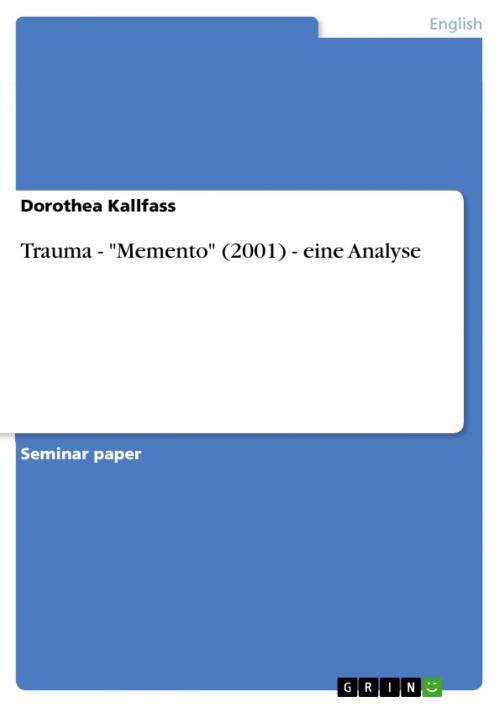Trauma - 'Memento' (2001) - eine Analyse
'Memento' (2001) - eine Analyse
Nonfiction, Entertainment, Drama, Anthologies| Author: | Dorothea Kallfass | ISBN: | 9783638071093 |
| Publisher: | GRIN Publishing | Publication: | July 1, 2008 |
| Imprint: | GRIN Publishing | Language: | English |
| Author: | Dorothea Kallfass |
| ISBN: | 9783638071093 |
| Publisher: | GRIN Publishing |
| Publication: | July 1, 2008 |
| Imprint: | GRIN Publishing |
| Language: | English |
Seminar paper from the year 2004 in the subject American Studies - Miscellaneous, grade: 1,7, Free University of Berlin (John F. Kennedy-Institut für Nordamerikastudien), course: HS: American Cultural Memory: Trauma, Collective Imagery, and the Politics of Remembering, 2 entries in the bibliography, language: English, abstract: The movie Memento shows the relation between overwhelming experience and psychopathology. The idea that some memories can become the nucleus of later psychopathy fascinated psychologists like Pierre Janet, and made them look closely on how the mind processes memories. The Christopher Nolan movie imitates this neural process by using different techniques: there is the backward structure with its constant overlapping and adapting of old and new information for example. Also, the mixture of black and white images frozen in space and time, together with colourful, 'realistic' pictures of a developing plot, leaves the audience confused as to what is past and what is present, what is real and what is imagined. And finally, the erratic movement can be seen as an imitation of the movement of our mind when we remember.
Seminar paper from the year 2004 in the subject American Studies - Miscellaneous, grade: 1,7, Free University of Berlin (John F. Kennedy-Institut für Nordamerikastudien), course: HS: American Cultural Memory: Trauma, Collective Imagery, and the Politics of Remembering, 2 entries in the bibliography, language: English, abstract: The movie Memento shows the relation between overwhelming experience and psychopathology. The idea that some memories can become the nucleus of later psychopathy fascinated psychologists like Pierre Janet, and made them look closely on how the mind processes memories. The Christopher Nolan movie imitates this neural process by using different techniques: there is the backward structure with its constant overlapping and adapting of old and new information for example. Also, the mixture of black and white images frozen in space and time, together with colourful, 'realistic' pictures of a developing plot, leaves the audience confused as to what is past and what is present, what is real and what is imagined. And finally, the erratic movement can be seen as an imitation of the movement of our mind when we remember.















